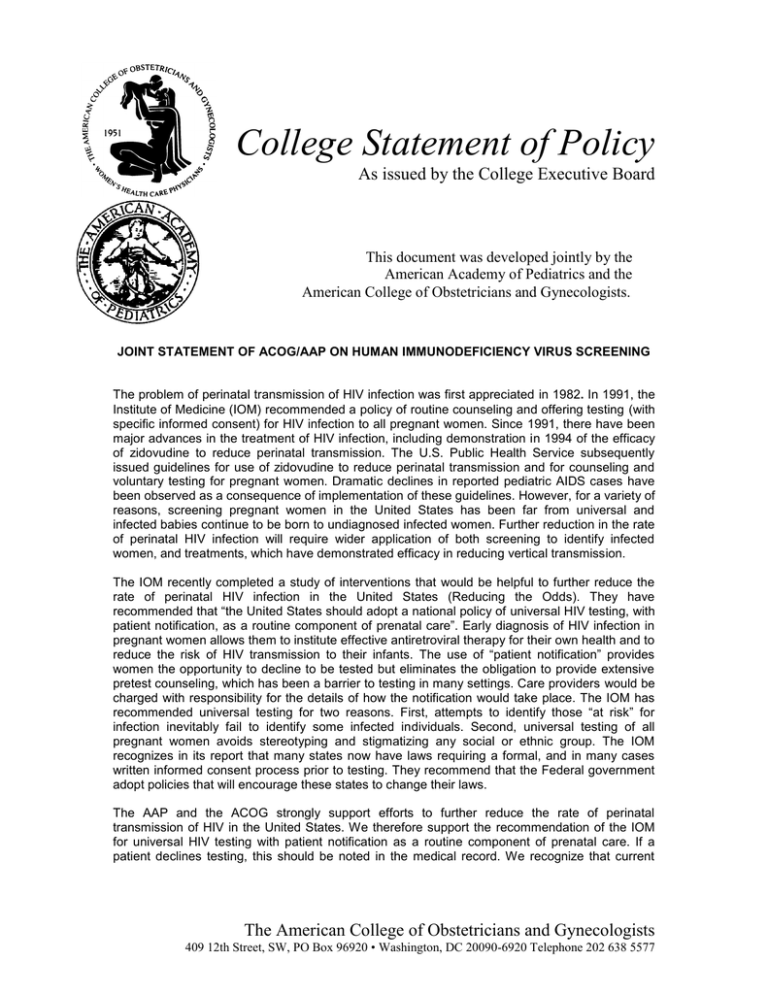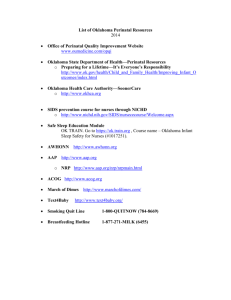College Statement of Policy As issued by the College Executive Board
advertisement

College Statement of Policy As issued by the College Executive Board This document was developed jointly by the American Academy of Pediatrics and the American College of Obstetricians and Gynecologists. JOINT STATEMENT OF ACOG/AAP ON HUMAN IMMUNODEFICIENCY VIRUS SCREENING The problem of perinatal transmission of HIV infection was first appreciated in 1982. In 1991, the Institute of Medicine (IOM) recommended a policy of routine counseling and offering testing (with specific informed consent) for HIV infection to all pregnant women. Since 1991, there have been major advances in the treatment of HIV infection, including demonstration in 1994 of the efficacy of zidovudine to reduce perinatal transmission. The U.S. Public Health Service subsequently issued guidelines for use of zidovudine to reduce perinatal transmission and for counseling and voluntary testing for pregnant women. Dramatic declines in reported pediatric AIDS cases have been observed as a consequence of implementation of these guidelines. However, for a variety of reasons, screening pregnant women in the United States has been far from universal and infected babies continue to be born to undiagnosed infected women. Further reduction in the rate of perinatal HIV infection will require wider application of both screening to identify infected women, and treatments, which have demonstrated efficacy in reducing vertical transmission. The IOM recently completed a study of interventions that would be helpful to further reduce the rate of perinatal HIV infection in the United States (Reducing the Odds). They have recommended that “the United States should adopt a national policy of universal HIV testing, with patient notification, as a routine component of prenatal care”. Early diagnosis of HIV infection in pregnant women allows them to institute effective antiretroviral therapy for their own health and to reduce the risk of HIV transmission to their infants. The use of “patient notification” provides women the opportunity to decline to be tested but eliminates the obligation to provide extensive pretest counseling, which has been a barrier to testing in many settings. Care providers would be charged with responsibility for the details of how the notification would take place. The IOM has recommended universal testing for two reasons. First, attempts to identify those “at risk” for infection inevitably fail to identify some infected individuals. Second, universal testing of all pregnant women avoids stereotyping and stigmatizing any social or ethnic group. The IOM recognizes in its report that many states now have laws requiring a formal, and in many cases written informed consent process prior to testing. They recommend that the Federal government adopt policies that will encourage these states to change their laws. The AAP and the ACOG strongly support efforts to further reduce the rate of perinatal transmission of HIV in the United States. We therefore support the recommendation of the IOM for universal HIV testing with patient notification as a routine component of prenatal care. If a patient declines testing, this should be noted in the medical record. We recognize that current The American College of Obstetricians and Gynecologists 409 12th Street, SW, PO Box 96920 • Washington, DC 20090-6920 Telephone 202 638 5577 JOINT STATEMENT OF ACOG/AAP ON HUMAN IMMUNODEFICIENCY VIRUS SCREENING Page 2 laws in some states may prevent implementation of this recommendation at this time. We encourage our members and Fellows to include counseling as a routine part of care, but not as a prerequisite for, and barrier to, prenatal HIV testing. Approved by the ACOG Executive Board, May 1999 Approved by the AAP Executive Board, May 1999 Reaffirmed by the AAP Executive Board, September 2005 Reaffirmed by the ACOG Executive Board, July 2006 Reaffirmed by the ACOG Executive Board, July 2011 Reaffirmed by the ACOG Executive Board, July 2014


